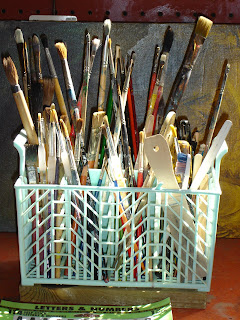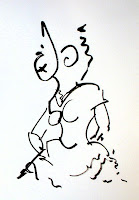 I remember back in the Seventies when The Population Bomb was popular and the prophets of doom seemed to have taken over all the media soapboxes so that we were running out of food and running out of oil and running out of everything because there were too many people. Paul McCartney himself wrote about it on his Ram album: "Too Many People." At that time things were compounded by economic collapse and Cold War mania.
I remember back in the Seventies when The Population Bomb was popular and the prophets of doom seemed to have taken over all the media soapboxes so that we were running out of food and running out of oil and running out of everything because there were too many people. Paul McCartney himself wrote about it on his Ram album: "Too Many People." At that time things were compounded by economic collapse and Cold War mania.In the Eighties, even though things seemed to boom there was this constant reminder that we were going to run out of oil. I always remember statements like, "We will run out of oil in the next ten years." In the Nineties, ten years later, I would occasionally hear this same lament on talk radio, and in 2003 our local talk show Leftie Duke Skorich was rambling on with the same tired warning: "And we will be out of oil in ten years. As you know we are completely dependent on oil today."
The whole oil lament reminds me of the Flatworlders who had a difficult time getting their heads around the Copernican notion that the earth was round. Copernicus, who so feared telling the truth about his observations that he waited till he was on his deathbed lest the Church burn him as a heretic, understood how the Cosmos worked when it came to the movement of heavenly bodies.
And in our own time, it was an astrophysicist who accidentally discovered the possibility that oil had nothing to do with dead vegetation and dinosaurs, but was part part of the core content of our earth.
His name was Thomas Gold, of Cornell University. He studied asteroids. And one day he began asking the right question about what he was observing. Why are there hydrocarbon chains on asteroids coming in from outer space if hydrocarbon molecules are from dead plants and animals? Good question, Mr. Gold.
In 1999 I wrote an article about Professor Gold's work, which I myself had encountered in 1986 in a cover story that appeared in The Atlantic magazine. My piece, which appeared in the National Oil & Lube News, was called "Are Fossil Fuels An Old Fashioned Idea Whose Time Has Gone?"
 It begins by my recounting a trip to the 1964 New York World's Fair and the large dinosaur that was an emblem for Sinclair, for fossil fuels and the oil industry. I wrote:
It begins by my recounting a trip to the 1964 New York World's Fair and the large dinosaur that was an emblem for Sinclair, for fossil fuels and the oil industry. I wrote:There's no question Sinclair's dinosaur was a powerful symbol. Dinosaurs had great power in the imaginations of young people. Whatever became of the dinosaurs? That big green brontosaurus graphically planted the answer in our minds. Yesterday's dinosaurs are today's fuel. It is all part of the circle of life, you might say. Yesterday's dead critters and ancient vegetation are producing today's energy, hence our familiarity with the term "Fossil Fuels" when speaking of gas and petroleum.
The only problem with the dino image is this: What if it's not true?
Well, here we are ten years later and people still don't realize how abundant our world's oil supply is. For better or for worse, here is a very recent account from Discovery News. Check it out: Earth's Mantle: Untapped Oil Source?
The petroleum we rely on to fuel our cars and heat our homes were formed over millions of years as ancient, dead algae and plankton were compressed in layers of sediment and heated. Because of this, oil companies know to look for new reserves in places that are, or once were shallow marine environments.
For decades, though, scientists have toyed with a tantalizing alternative theory of petroleum formation: What if chemical reactions between water and minerals deep in Earth's mantle could send black gold bubbling up into the crust?
Alexander Goncharov of the Carnegie Institution of Washington in Washington, D.C and a team of researchers have shown that just such a thing is possible. They heated methane (CH4) up to 1,500 degrees Kelvin (2,240 degrees Fahrenheit) and mimicked the squeezing effect of being buried under over 100 kilometers (62 miles) of solid rock.
The results were astonishing -- methane readily transformed into butane (C4H10) and propane (C3H8), two common components of crude oil.


































 And
And 